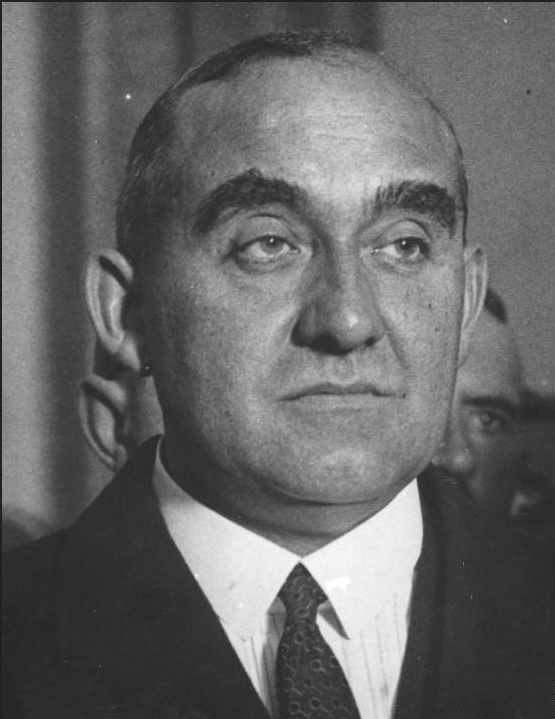April 23, 1931
Albert Carl Grzesinski (July 28, 1879 – January 12, 1948) was a German SPD politician and Minister of the Interior of Prussia from 1926 to 1930.
Grzesinski was born Albert Lehmann in Treptow an der Tollense, Germany, the illegitimate son of a maid, and grew up with grandparents. He assumed the name of his stepfather in 1892. He became a member of the SPD in 1897. In 1919, he became Under-Secretary of State in the Prussian War Ministry. He declined the position as Reichswehr Minister (Defense) in 1920. From 1922 to 1924, he was chief of the Prussian Police, and from 1925 to 1926, he was chief of the Berlin Police.
Grzesinski’s tenure as Minister of the Interior was marked by his efforts to promote democracy, and by the political violence in Germany at the time, especially the violence committed by the communists and hostility between the communists and the social democrats. In 1929, he banned the Rotfrontkämpferbund (Red Front Fighter’s League) in Prussia. In May 1929 he was involved in the violent police suppression of illegal open-air communist rallies in Berlin meant to celebrate May Day, which led to several days of rioting known as Blutmai (“Bloody May”). Over thirty civilians would be killed and over a thousand arrested, leading to widespread criticism over the government response.
Grzesinski resigned on February 28, 1930, for personal reasons. From 1930 to 1932, he was again chief of police. In 1931, as Berlin’s police chief, he tried to gag Adolf Hitler, ordering him deported as an undesirable alien, but Chancellor Heinrich Brüning did not sign the order. He was removed from his position following the 1932 Preußenschlag (Prussian Coup), when he was succeeded by the former police chief of Essen, Kurt Melcher. According to Christopher Clark, he referred to the Austrian-born Hitler as “the foreigner” and found it “lamentable” that he should be negotiating with the government “instead of being chased away with a dog whip.”
Following the Nazi rise to power, and with his name appearing on the first list of Germans who were arbitrarily officially denaturalized according to a new law, which also ensued in the seizure of all his property in Germany, Grzesinski became stateless. He fled to Switzerland in 1933. He then emigrated to France, and in 1937, to the United States. In exile, he was active in anti-Nazi organizations. He died in Queens, New York.
Transcript
Die ersten Vereine bildeten sich in den 80er und 90er Jahren, als wegen einiger aufstehender, erregender Prozesse, zum Beispiel der Ermordung des Nachtwächters Braun durch die Eheleute Heinze, sich die Öffentlichkeit und noch mehr die Kriminalpolizei mit dem Treiben der Berliner Zuhälter beschäftigt hätten.
Die Zuhälter schlossen sich damals in Gruppen zusammen, gelobten sich Schutz und Hilfe gegen diese verfolgenden Beamten und gegen Entgleisungen ungetreuer Dirndlern.
Insbesondere wurde bei Strafverfahren gegen Zuhälter aus Vereinsmitteln ein tüchtiger Verteidiger gestellt.
Weiter wurden in Zäunenkreisen vorsichtige Verdunkelungen besorgt und schließlich der festgenommene Kollege mit Liebesgaben und sonstigen Tröstungen bedacht.
Dieser Wohlfahrtseinruher erhielt eine Summe aus der Vereinskasse, damit er vor der Hand etwas zum Leben hatte, eventuell wurde er auch bei gewissen Schankwirten als Kellner, Geschäftsführer und anderen untergebracht, bis eine neue Frau die weitere Sorge für den Bruder übernahm.
Damit die Öffentlichkeit und die Polizei von dem Bestehen und den Bestrebungen der Vereine nichts gewahr wurden, wurden möglichst unauffällige, harmlose Namen gewählt und der Zweck verschleiert.
Die Mittel zur Durchführung ihrer Bestrebungen zogen die Vereine aus außergewöhnlich hohen Eintrittsgeldern, Mitgliederbeiträgen, Strafgeldern und öffentlichen Vergnügungen.
Zur Zeit bestehen in Berlin etwa 50 Vereine dieser Art, von denen die größteren in drei Verbänden zusammengeschlossen sind.
Zu dem ältesten Verband, Ring Groß Berlin, gehören unter anderem die Vereine Königstadt, 1880, der Vergnügungsverein, wieder auf die Namen zu achten, Glaube, Liebe, Hoffnung, 1882, Lotterie und Vergnügungsverein Norden, 1902, Spar- und Geselligkeitsverein, Immertreu und so weiter und so weiter.
Der zweite Verband heißt Freier Bund.
Er wurde 1926 gegründet und zu ihm gehören die Vereine Männergesang, Verein Heimatklänge, Sparverein Alt-Rixdorf, Verein Lustige Brüder, Lotterie und Geselligkeitsverein Alte Freunde und so weiter.
Dem dritten Verband gehören unter anderem die Vereine an Hand in Hand, von denen bei dem Überfall in der Kurigstraße die Rede war, Moabit, Bruderhand, Alt-Berlin, Treue Freunde und so weiter.
Dann gibt es eine ganze Anzahl Vereine, welche einem der genannten Verbände nicht angehören.
Die bekanntesten dieser Vereine sind Sportclub Deutsche Kraft, früher Roland 1895, Geselligkeitsverein Fidelio, Stadtclub Herz 8 und so weiter.
Wenn Geschäftsleute durch das Auftreten von Vereinsmitgliedern ein- und desselben Vereins belästigt und bedrängt werden sollten, dann empfiehlt es sich die Hilfe der zuständigen Polizeistelle oder die für derartige Ausschreitungen bestehende Zentralstelle E5 sofort in Anspruch zu nehmen und weitere Bedrohungen erneut mitzuteilen.
Ganz verkehrt ist es, meine sehr verehrten Zuhörerinnen und Zuhörer, etwa aus Angst, die Anzeige nicht zu erstatten oder die schon erstattete Anzeige zurückzunehmen, wie das vorgekommen ist, und dadurch eine Bestrafung der Täter zu verhindern.
Ich stimme durchaus zu, wenn die Zeitungen von einem Unterweltskandal sprechen und verlangen, dass die Polizei Ringvereins Terror nicht mehr dulden dürfe.
Nicht richtig ist es aber, dass die Polizei an sich gegen die Vereine und ihre Mitglieder nichts unternehmen könnte.
Notwendig ist jedoch, wie schon betont, die Mitarbeit des Publikums und insbesondere derjenigen, die sich bedroht fühlen.
Wenn aber die Terrorisierten keine Anzeige erstatten oder aus Angst eine erstattete Anzeige gar zurücknehmen, dann muss die Polizei allerdings zusehen, auch wenn sie das vielfacher an Kräften wie heute zur Verfügung hätte.
Und ihre Recherchen müssen tatsächlich ein negatives Ergebnis haben.
Deshalb noch einmal, Mitwirken des Publikums ist unbedingt erforderlich.
Wie überall so auch hier, sowohl hinsichtlich der Anzeigererstattung als auch beim Festbleiben im Zeugnis des Tatsächlichen gesehen und beobachtet.
Irrführend!
Ja, genau genommen, eigentlich wenig verantwortungsbewusst ist die Behauptung einer Zeitung, dass 18 Kriminalisten gegen 30 Ringvereine stünden und die Polizei aktiver werden müsste.
Der ganze Satz ist Wort für Wort und Zahl für Zahl falsch.
Ich will nur noch auf die angeblich nur 18 Kriminalisten eingehen, die den Ring vereinen, deren Zahl sich ja wie schon bemerkt auf etwa 50 beläuft, nur angeblich gegenüber ständen.
Die Behauptung ist insofern irreführend, als nicht nur die Kriminalbeamten der Inspektion E5 unter dem sehr tüchtigend, auch heute noch sehr agilen und aktiven Kriminalkommissar Gundlach für Vergehen und Verbrechen, sondern die gesamte Berliner Kriminalpolizei, je nachdem um welche strafbare Handlung es sich in jedem Einzelfall handelt, zur Verbrechensbekämpfung auch der Ringverein und ihren Mitgliedern zur Verfügung und jederzeit bereit steht.
The first associations were formed in the 80s and 90s, when due to a number of exciting, exciting trials, for example the murder of the night watchman Braun by the Heinze couple, the public and even more so the criminal police became concerned with the activities of the Berlin pimps. At that time, the pimps formed groups and vowed to protect and help each other against these persecuting officials and against the derailments of unfaithful dirndlers. In particular, in criminal proceedings against pimps, a capable defense attorney was provided using club funds. Careful blackouts were also arranged in fence circles and finally the arrested colleague was given gifts of love and other consolations. This welfare worker received a sum from the club’s treasury so that he had something to live on before hand. He may also have been placed with certain innkeepers as a waiter, manager and others until a new woman took over the further care of his brother. So that the public and the police were unaware of the associations’ existence and aspirations, the most inconspicuous and harmless names were chosen and the purpose was concealed. The clubs obtained the means to carry out their efforts from exceptionally high entrance fees, membership fees, fines and public entertainment. There are currently around 50 clubs of this type in Berlin, the largest of which are grouped into three associations. The oldest association, Ring Groß Berlin, includes, among others, the Königstadt clubs, 1880, the entertainment club, to pay attention to the names again, Faith, Love, Hope, 1882, lottery and entertainment club Norden, 1902, savings and social club, Immertreu and so on and so forth. The second association is called the Free Federation. It was founded in 1926 and includes the Men’s Singing Association, the Heimatklänge Association, the Alt-Rixdorf Savings Association, the Funny Brothers Association, the Lottery and the Old Friends Social Association and so on. The third association includes, among others, the Hand in Hand clubs that were mentioned during the attack on Kurigstrasse, Moabit, Bruderhand, Alt-Berlin, Treue Freunde and so on. Then there are a number of clubs that do not belong to one of the associations mentioned. The best known of these clubs are the German Kraft sports club, formerly Roland 1895, the Fidelio social club, the Herz 8 city club and so on. If business people are harassed and harassed by the appearance of club members of one and the same club, then it is advisable to immediately seek the help of the responsible police station or the E5 central office for such riots and to report further threats again. It is completely wrong, my dear listeners, not to file a complaint out of fear or to withdraw a complaint that has already been filed, as has happened, and thereby prevent the perpetrators from being punished. I definitely agree when the newspapers talk about an underworld scandal and demand that the police no longer tolerate Ringverein’s terror. However, it is not true that the police cannot take any action against the clubs and their members. However, as already emphasized, what is necessary is the cooperation of the audience and especially those who feel threatened. But if the terrorized people do not file a complaint or even withdraw a complaint out of fear, then the police have to watch, even if they have many times more forces at their disposal than they do today. And their research must actually have a negative result. So once again, audience participation is essential. As everywhere else, here too, seen and observed both in terms of reporting the matter and sticking to the evidence of the facts. Misleading! Yes, strictly speaking, a newspaper’s claim that there are 18 criminal investigators against 30 wrestling clubs and that the police should be more active is actually not very responsible. The entire sentence is wrong word for word and number for number. I just want to talk about the supposedly only 18 criminalists who unite the ring, whose number, as already mentioned, is around 50, only supposedly standing opposite each other. The claim is misleading in that not only the detectives of the E5 inspection under the very efficient, even today very agile and active detective inspector Gundlach for misdemeanors and crimes, but the entire Berlin criminal police, depending on which criminal offense is involved in each individual case The wrestling club and its members are also available to combat crime and are available at any time.

Author of the World War II Multimedia Database

